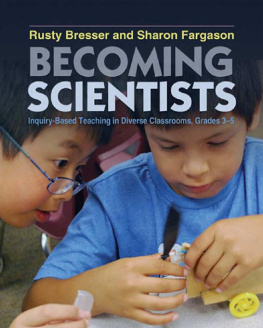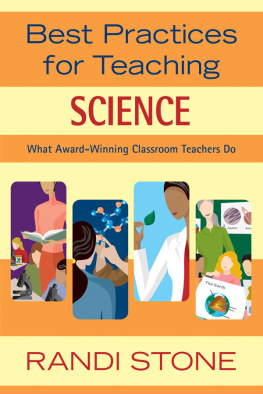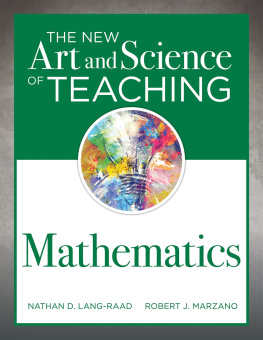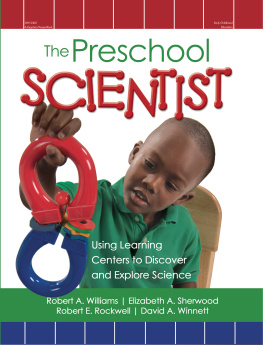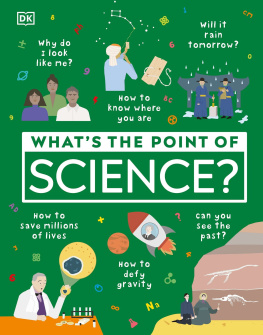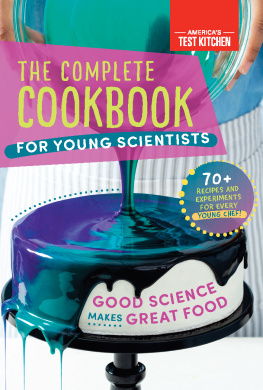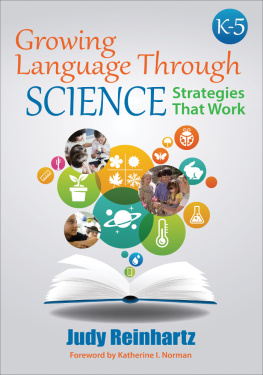BECOMING SCIENTISTS
Inquiry-Based Teaching in Diverse Classrooms, Grades 35
Rusty Bresser and Sharon Fargason

Stenhouse Publishers
www.stenhouse.com
Copyright 2013 by Rusty Bresser and Sharon Fargason
All rights reserved. No part of this publication may be reproduced or transmitted in any form or by any means, electronic or mechanical, including photocopy, or any information storage and retrieval system, without permission from the publisher.
Every effort has been made to contact copyright holders and students for permission to reproduce borrowed material. We regret any oversights that may have occurred and will be pleased to rectify them in subsequent reprints of the work.
Library of Congress Cataloging-in-Publication Data
Bresser, Rusty.
Becoming scientists : inquiry-based teaching in diverse classrooms,
grades 35 / Rusty Bresser and Sharon Fargason.
pages cm
Includes bibliographical references and index.
ISBN 978-1-57110-978-1 (pbk. : alk. paper)ISBN 978-1-57110-995-8
(ebook) 1. ScienceStudy and teaching (Elementary) 2. Inquiry-based
learning. 3. Multicultural education. I. Fargason, Sharon, 1949 II. Title.
LB1585.B67 2013
372.35044dc23
2013011208
Cover design, interior design, and typesetting by Martha Drury
Manufactured in the United States of America

19 18 17 16 15 14 13 9 8 7 6 5 4 3 2 1
Rusty would like to dedicate this book to Sandra Arkin,
who introduced him to inquiry science.
Sharon would like to dedicate this book to her students
past and presentwhose excitement about science and
inquiry has helped her become a better teacher.
CONTENTS
by Fred Goldberg
Becoming Scientists: Inquiry-Based Teaching in Diverse Classrooms uses real stories of active, student-centered learning to show the reader inquiry science in action. An easy-to-read conversational tone weaves educational research with practical, best practice strategies demonstrated as classroom examples. The experiences of an exemplary elementary teacher define a clear target for all educators, novice and veteran, to design learning environments and experiences that support inquiry learning for all learners.
Sharon Bowers, Secondary Science Presidential Award
Winner; Educator in Residence, Center for Integrative
STEM Education at the National Institute of Aerospace
This book holds the key to training the next generation of engineers. The style of inquiry-based instruction advocated by Bresser and Fargason encourages students to be autonomous thinkers and doers, equipping them with the skills and confidence necessary to tackle the types of open-ended and ambiguous problems that are ubiquitous in engineering practice.
Brandon Reynante, Mechanical and Aerospace Engineer,
ATA Engineering; Elementary Science Educator
An important work! A timely work! A must-read for educators dedicated to providing authentic science experiences for todays youth. Drawing upon both research and actual classroom practice, Bresser and Fargason provide a guidebook of sorts for practitioners to navigate their way into and through the Next Generation Science Standards, enabling teachers to see a model of how to facilitate learning experiences that will allow diverse learners from all backgrounds to engage in the doing of science, while grounding their learning in the core ideas and crosscutting concepts outlined in our newest educational standards. So many books out there tell you about best practices; this one truly shows you how to enact best practices. This is the way for students to learn scienceto grapple with real issues and think critically to solve problems we face today and in the near future. Bresser and Fargason have provided the science educational community with a clear vision of how inquiry science can be taught so that all students can fully participate and begin to close the achievement gap in science.
Rachel Millstone, Codirector, California Science Project,
University of California, San Diego
FOREWORD
The Next Generation Science Standards (NGSS) is intended to support a vision for a science classroom where students of diverse backgrounds and English language abilities are all actively engaged in the practices of science, and where core ideas and crosscutting concepts emerge from those practices. Such a classroom is one where the teacher and students are engaged in authentic scientific inquiry. What might such a classroom actually look like, and how can teachers prepare themselves for enacting this new vision of inquiry science? This very readable book, coauthored by Rusty Bresser and Sharon Fargason, provides substantive answers to those questions. Focusing both on the research base and on real classroom examples, the authors lay out a plan to help teachers, administrators, and science educators transform the NGSS vision into practice.
Let me share a story from Sharons classroom to illustrate why Im excited about Becoming Scientists. A few years ago, Sharon joined a professional development project that I was involved with that encouraged teachers to try a new approach to their science teaching. Rather than designing lessons aimed at guiding their students to achieve specific content objectives (for example, district-mandated benchmarks), we wanted teachers to design their classroom activity around their students own ideas. We wanted teachers to listen carefully to the substance of students ideas and reasoning, and to make their next-move decisions based on the merits of those ideas. We referred to this strategy as responsive teaching. Thus, the sequence of what would happen in the science classroom each day would not be predetermined, but instead would occur in response to the students as they proposed, critiqued, discussed, and tested their ideas. The teacher might have certain core ideas in mind that he or she wanted students to learn, but with responsive teaching those ideas could emerge from the students engagement in scientific inquiry. Sharon seemed quite intrigued with this idea of responsive teaching; it just seemed natural to her. She knew this could be a challenge, especially since her classroom was very diverse and most of her students would be English language learners. Nevertheless, she decided to try it out at the beginning of the following school year.
While other teachers at her grade level were using the district-mandated curriculum module about the earth, moon, and sun for the first third of the school year, Sharon spent the first half of that time teaching responsively, using the context of toy cars as a way to teach about the earth, moon, and sun. (The project staff had suggested that toy cars might be a good context for generating a lot of student ideas.) She thought things were working well and decided to have her students think about phenomena related to the earth, moon, and sun, but instead of following the mandated curriculum, she continued teaching responsively, following the students own ideas. She never even had the students open the book provided for the curriculum. When it came time for the districts benchmark test on the earth, moon, and sun unit, she decided to have her students take it, even though her principal had agreed (as part of Sharons participation in the project) that they did not have to do it.

